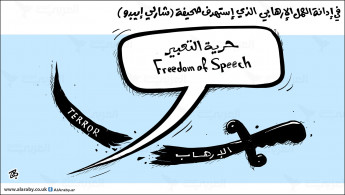Tunisia decries attack but little mention of press freedom
A flamingo drowns in his own tears. That was Tunisian cartoonist Z’s response - using his trademark pink animals - to the deadly attack on the offices of the French satirical magazine Charlie Hebdo in Paris on 7 January.
In a second cartoon Friday, he got angrier. This one depicted God. The caption read: "I am starting cartooning. You?"
The attack was widely condemned in Tunisia, but so far has
| Send me anything you want, but nothing on God. I don’t want to have my house burned down. - Taoufik Ben Brik |
sparked little by way of debate over the country's own resstriciton on freedom of expression.
Tunisian civil society, government and personalities overwhelmingly expressed their sympathy following the murder of twelve, among them the magazine’s founders.
President-elect Beji Caid Essebssi sent French President François Hollande his condolences. The Islamist party Ennahdha condemned “in the strongest terms these terrorist acts, their perpetrators, and those who support them”. Meherzia Labidi, Ennahdha MP and former vice-president of the Tunisia’s legislative assembly, said she “entirely shares the slogan ‘I too am Charlie Hebdo’.”
On the streets too there was condemnation.
“It is a savage reaction,” says Ridha, 48. The carpenter, who just finished his prayers, admitted he was “obviously very bothered” by cartoons depicting the Prophet Muhammad. “But I won’t go kill someone because of it.”
It was not universal, though. Some Tunisians justified the attack, saying the magazine had published blasphemous drawings.
| Arab cartoonists respond to Charlie Hebdo attacks - see our gallery |
Ahmed, a 30-year-old shopkeeper, said the cartoonists “paid what they had to pay, it’s the rule”. Charlie Hebdo had been repeatedly threatened for publishing satirical cartoons of the Prophet Muhammad. Ahmed said the magazine had used the media to create religious discord.
The attack prompted strong official condemnation. Notably, no Tunisian official made reference to the defence of freedom of expression. The Ministry for Religious affairs condemned the “criminal act” but also called on journalists to “avoid infringing on religion”.
Dealing with ‘blasphemers’
Blasphemy remains an important issue in democratic Tunisia. Since the ouster of the former autocrat Ben Ali in 2011, repeated revenge attacks and prison sentences against “blasphemers” have sparked heated debate.
The blogger Jabeur Mejri was sentenced to seven-and-a-half years in prison after he published satirical cartoons of the prophet similar to Charlie Hebdo’s. He was pardoned two years into the sentence.
On the eve of Tunisia’s first democratic elections in October 2011, the TV channel Nessma TV ran the animated movie Persepolis, which features the image of a bearded God sitting on a cloud. The event enraged parts of Tunisian society and triggered violent attacks, with nearly 200 Salafis storming the channel’s headquarters.
The 2011 Tunisian revolution heralded an era of freedom of political expression for a country plagued with 50 years of censorship. But as Tunisians began to freely criticise the government, they soon discovered their freedom stopped where religion began.
In an interview for Charlie Hebdo in 2012, the Tunisian cartoonist Z spoke with Charb, one of the victims of the January 7 attack. He told him of the time he offered his drawings for publication to a historic opponent of the regime, Taoufik Ben Brik.
“Ben Brik answered: Send me anything you want, but nothing on God. I don’t want to have my house burned down,” Z recalled in the interview.
“Ben Brik, the very symbol of transgression, knows that religion is a red line,” Z said. “I think this line has to be pushed back even more.”
Keeping everyone happy?
When he started drawing, Z stayed anonymous because he was mocking Ben Ali’s family. He now mocks everyone, including religious extremists. But he has maintained his anonymity.
In the much-praised constitution passed in early 2014, the Tunisian representatives sought a middle ground on freedom of expression. Article 6 forbids attacks on the sacred as well as accusations of apostasy. Approved by a vast majority of MPs, Islamist and non-Islamist alike, the article was widely criticised for placing too many limits on freedom of expression.
“The ambiguity attempts to keep everyone happy,” said Amna Guellali, director for Human Rights Watch Tunisia.
“Tunisians are split: some hope for a freedom of expression without limits, others consider that all sorts of blasphemy must be punished,” she said.
Amna Guellali doesn’t know how the ambiguity will evolve. The political balance of power will decide, she said. In the wake of the 2014 elections, a coalition around the dominant party Nidaa Tounes is currently being negotiated.
In order to appease a society in transition, Tunisia is trying to do the splits between a desire for freedom and the protection of religious values. Amna Guellali is dountful this can succeed. “We’ll wait and see.”



